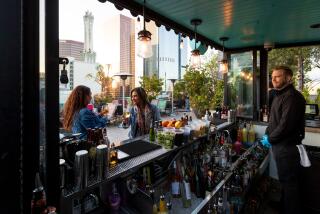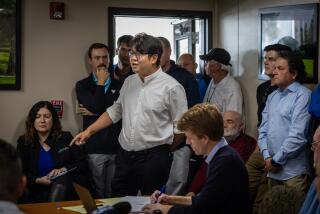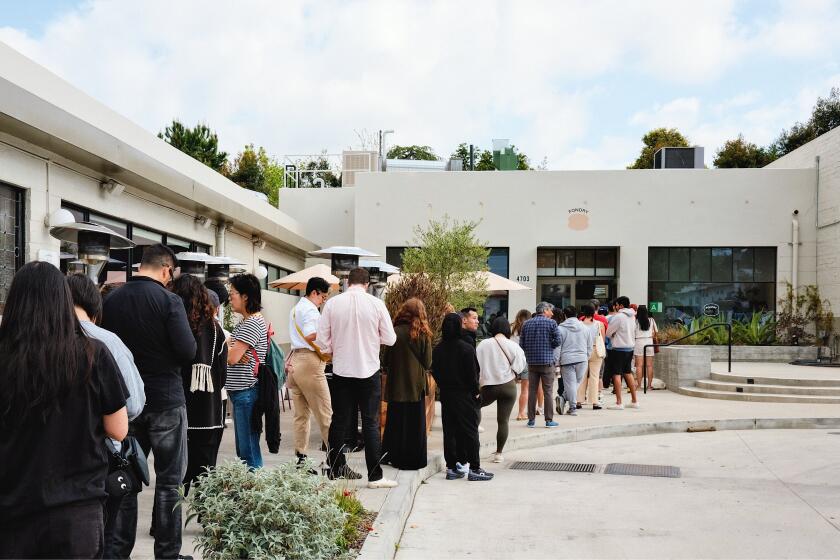Farmers markets fear Los Angeles’ fees

Farmers market managers in Los Angeles are in a tizzy over a proposed city ordinance that would charge more than 20 markets tens of thousands of dollars to recoup the city’s costs of enabling their events, which could force them to close or move if new ways to cover the costs can’t be found.
“It’s pretty scary, and we’re all trying to figure out exactly what’s going on,” said Melissa Farwell, a market coordinator for Raw Inspiration Inc., which sponsors 15 local markets.
Since the first certified farmers market in the city of Los Angeles was established in 1980, the city has covered such expenses as traffic control officers, traffic barriers and no-parking signs. For many years, legislators and policy analysts have proposed billing markets for these costs, but only this month, faced with a giant budget deficit, has the Los Angeles City Council taken action.
On Sept. 1, it passed an ordinance modifying the process for issuing permits and recouping expenses for “special events,” a category that includes sports games, block parties and certified farmers markets. In the past, the city issued a notional bill for services to farmers markets but, in effect, waived these fees and absorbed the costs in its budget; the new ordinance eliminates this waiver. The second reading of the ordinance passed the council Sept. 8, and Mayor Antonio Villaraigosa has until Friday to sign; it might take effect as soon as mid-October.
There are about 48 certified farmers markets in the city of Los Angeles. Almost half of them could be subject to this ordinance because they are held on or next to streets that are closed off the day they take place (markets in other locations, such as parks and private property, as well as venues outside Los Angeles city limits, would not be affected).
Figuring expenses
Just how much the city is spending for farmers markets and how the expenses are calculated remain unclear at this point. Diana Rodgers, manager of the Mar Vista farmers market, says she recently received one of those notional monthly bills for $6,709, which was waived after her councilman, Bill Rosendahl, filed a motion.
For the first three years of the market’s existence, all the city did was provide plastic barricades and temporary street closure signs, although last month two traffic control officers were assigned to her market, she said.
Rodgers called the monthly bill, which would total $80,508 a year, “infuriating,” and “an arbitrary number,” adding, “No one has given any indication what this is really for.” If the market had to pay that and received no relief, she said, it would have to close or find another space.
Pompea Smith, chief executive of Sustainable Economic Enterprises of Los Angeles, which organizes markets affected by the ordinance in Hollywood and Echo Park, estimated that the real costs for the services the city provides range from $500 to $1,500 yearly, depending on the size of the market.
Accounting sought
In some cases, however, the expenses could be much more substantial: Police services for the two Santa Monica farmers markets on Arizona Avenue, which are not in Los Angeles, amount to some $172,000 yearly, said Laura Avery, the markets’ supervisor. In Santa Monica, as in Beverly Hills, the city sponsors farmers markets, absorbing the income from fees, and covering expenses, including street closure and traffic control costs.
Concerned about the effect that the new ordinance could have on farmers markets, Los Angeles City Councilman José Huizar, who represents the 14th District, introduced a motion Sept. 1. asking the city to provide an accounting of the costs associated with farmers markets; to consolidate the weekly permits for each market into one annual bill, with an estimated cost of $27,456; and to draw up a list of markets that could qualify for some or all of their expenses to be covered by the city, if they were treated as block parties or citywide events.
There is a provision in the ordinance for farmers markets sponsored by civic or charitable organizations to have their street-closure expenses subsidized in whole or in part at the discretion of the City Council and the mayor; another category of markets, those sponsored by certified farmers, would not qualify for such funds. The money would come from “special event fee subsidy accounts,” $100,000 for each of the city’s 15 council districts, which are allocated by the council members.
“I feel very confident that our farmers markets are going to weather through this period,” said Councilman Bill Rosendahl, who has four affected markets in his 11th District. “Under no circumstances am I going to want to see any of my farmers markets closed down over this process.”
More to Read
Eat your way across L.A.
Get our weekly Tasting Notes newsletter for reviews, news and more.
You may occasionally receive promotional content from the Los Angeles Times.






